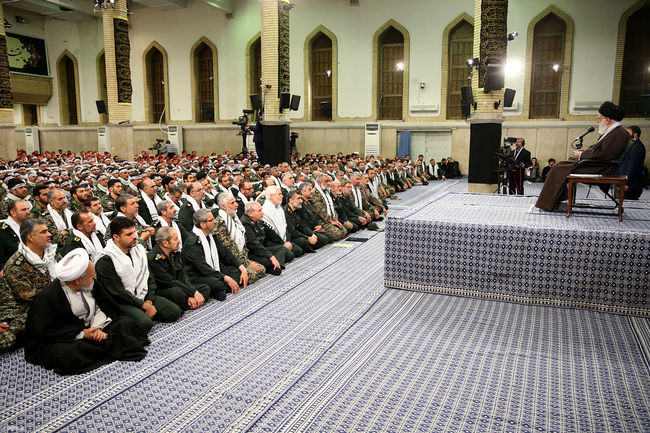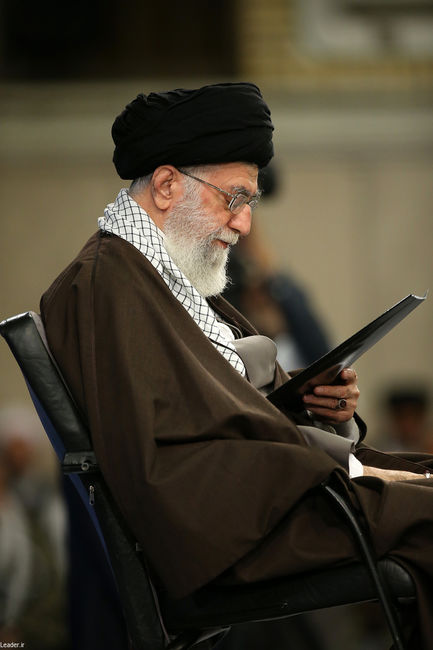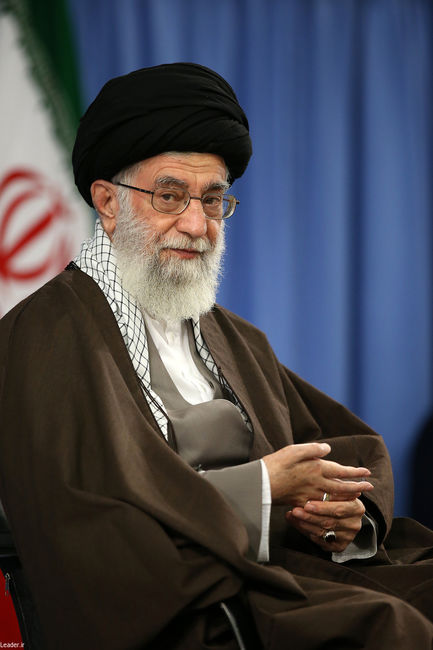Ayatollah Seyyed Ali Khamenei, the Leader of the Islamic Revolution, in a meeting on Wednesday with a group of 2,500 commanders of volunteer Basij forces, described the Basij as the “blessed and dynamic representative of the whole nation.” Elucidating methods used by hegemonic powers to bear enmity toward the Iranian nation, Ayatollah Khamenei said: “In the genuine battle and war launched by the hegemonic powers’ front against the ‘identity- and independence-seeking front,’ the Iranian nation will fulfill its obligations with regard to defending the brave Palestinian nation and the Intifada in the West Bank.”
Extending his congratulations on the occasion of Azar 5 on the Iranian calendar, falling on November 26, marking the anniversary of the establishment of the Basij in Iran, Ayatollah Khamenei said the establishment of the Basij was the art of the late Imam Khomeini, the founder of the Islamic Republic, and an initiative and blessed event, saying: “The formation of resistance groups in some countries during the time of fighting against oppression is nothing new, but that resistance groups survive after the phase of victory, become more exuberant and be developed both quantitatively and qualitatively is specific to the Basij
Clearly defining the Basij, the Leader of the Islamic Revolution said: “Basij is born out of the people and represents the nation and the Basijis are people who [do not hesitate to] show up in any field when necessary with an exalted divine objective and an indefatigable spirit to prove their talent, and they are not scared away by threats.”
Ayatollah Khamenei said the emergence and development of popular talents within the framework of Basij is a stunning reality pertaining to Basij, adding: “Besides renowned and great military commanders of the Sacred Defense (1980-1988 Iraqi imposed war), other prominent individuals who, like martyred nuclear scientists, have done great jobs and are continuing to do so have really been and are Basiji.”
Among the outstanding features of the Basij is its presence in different military, scientific, technological, artistic and cultural arenas as well as the Resistance Economy, said Ayatollah Khamenei, adding: “I have recommended the government tap into the potential of the Basij in the Resistance Economy, but Basij commanders must be careful because financial and economic issues are among the very shaky affairs and are among the traps set by the enemy.”
The Leader of the Islamic Revolution said the objective behind the Basij’s presence in different arenas is to defend the revolutionary and national ideals, values and identity against the “cunning, crafty, dishonest and devilish” enemy, adding: “Today, the US government is the manifestation of the animosity of the hegemonic powers’ front against the Iranian nation.”
Noting that the real battle on the global scale is under way between the hegemonic powers’ front led by the US and the front of national independence, identity and values led by the Islamic Republic of Iran, Ayatollah Khamenei said: “Besides political organizations and institutions, the hegemonic powers’ front enjoys financial power and the support of big Zionist companies and in fact the hegemonic powers’ front is continuously making plans through a triangle of ‘money and force and hypocrisy’.”
“Hypocrisy in the performance of political organs and the diplomacy of hegemony means that while ‘they are smiling at you and hugging you, they drive their dagger into your heart’,” said Ayatollah Khamenei.
Underscoring the necessity of permanent vigilance against different methods of “hard and soft enmity by hegemonic powers,” the Leader of the Islamic Revolution said: “Among the very important issues pertaining to soft enmity is the use of ‘infiltration’ scheme.”
“Some reacted to the bringing up of the issue of infiltration and said that this issue is being factionalized. Of course, if some are using it for factional purposes, they are doing the wrong thing, but these words should not lead to ignoring the main issue of ‘infiltration’ and drive it into oblivion,” Ayatollah Khamenei said.
“The important [for us] is to know and believe that the enemy is devising schemes and making plans in this regard,” added the Leader of the Islamic Revolution.
Ayatollah Khamenei said “casual infiltration” and “network and current-led infiltration” as the two main methods used by planners and masterminds of this phenomenon.
Regarding “casual infiltration”, for which there have been many cases in the past and now, the Leader of the Islamic Revolution said: “In this method which is deep-seated in political, governing and even religious apparatuses, undercover agents wearing behavioral or verbal masks and disguised as friend, penetrate the residence of targeted people or the institution and establishment run by an official.”
Ayatollah Khamenei said “intelligence gathering” and “espionage” are among the objectives of casual infiltration, but noted: “The more important objective pursued in casual infiltration is ‘to influence decision-making’.”
“In influencing the decision-making, the undercover agent tries to sway the mindset of the official or individual who is influential in the affairs of the society and the country vis-à-vis various issues, so that the latter would make the same decision and the same move the former desires,” the Leader of the Islamic Revolution added.
Ayatollah Khamenei described “current-led and network infiltration” as more dangerous than other methods, adding: “In this method, the enemy mainly creates networks inside the nation and in the country using the two instruments of ‘money and sexual allure’ in order to change the ideals, beliefs and subsequently the lifestyle.”
Ayatollah Khamenei added: “In the very dangerous current-led infiltration, a group of individuals pursuing a fake objective are linked together through different methods, so that their views on different issues would change gradually and would resemble the enemy’s views.”
The Leader of the Islamic Revolution said such a change in views would clear the ground for change in the ideals, beliefs and values, saying: “In this way, foreigners will realize their objectives without being identified and being imperiled.”
Ayatollah Khamenei said officials, directors, elites and people involved in making major decisions are the specific targets of the infiltration scheme and reiterated: “Citing possible and factional misuse by certain people, one should not underestimate the very issue of infiltration and the significance of this issue.”
The Leader of the Islamic Revolution said “marginal” issues complement the infiltration scheme, adding: “In this issue, those who insist on values and principles are accused of extremism and radicalism, so that in the shadow of their silence and the gradual weakening of the values and the ideals, the ground would be prepared for the realization of objectives of the infiltration scheme.”
To that effect, the Leader of the Islamic Revolution sharply criticized people and currents who accuse the Basij of extremism, saying: “We are not saying that these individuals and currents are doing so knowingly, but by [levelling] these accusations, intentionally or unintentionally, they weaken the fortified Basij embankment and complete the enemy’s dangerous infiltration scheme.”
Offering pieces of advice to those who, from different podiums and tribunes, are undermining and levelling false accusations against the supporters of the principles and fundamentals of the Islamic Revolution, Ayatollah Khamenei said: “Anyone speaking about the values and strengths of the revolution and the late Imam [Khomeini] should not face the accusation of factionalism and extremism.”
In another part of his speech, Ayatollah Khamenei referred to the growth and blossoming and “the continued influence and blessings of the Basij,” saying: “The future of Basij is bright, but we have to watch out for the scourges that are threatening the towering tree of the Basij, particularly from inside.”
The Leader of the Islamic Revolution said vanity and the ensuing negligence and entering a race associated with the gloss and glitter of the material world are among internal scourges which the Basij and the Basijis must completely watch out for.
Elucidating the priorities for the Basij, Ayatollah Khamenei highlighted piety and insight and said: “In the country’s domestic scene, we have to fully realize the footprint of the enemies and internal strengths and get to know the lofty and dignified standing of the Iranian nation in the region and the world.”
Criticizing those who are denying the great potentialities and capabilities of the Iranian nation by feeling humiliated vis-à-vis the West, Ayatollah Khamenei said: “Of course there are some weaknesses inside, but we should not ignore the important position of Iran in the region and the world as well as the achievements and capabilities of these ‘great, dear and honorable’ people by devotion to foreigners and humiliating the nation.”
Ayatollah Khamenei said daily growing preparedness was another priority for the Basij, noting: “We cannot remain indifferent with regard to the battle launched by the hegemonic powers’ front against the front of values and independence seeking. Based on this, the Islamic Republic of Iran’s positions on different issues, particularly the question of Palestine and the issues of Bahrain, Yemen and Syria and Iraq are fully clear-cut and rational.”
Stressing that the main objective pursued by the hegemonic powers’ front is to make the Palestinian cause slip into oblivion, the Leader of the Islamic Revolution said: “Despite all efforts by the hegemonic powers’ front and even the Arab governments aligning themselves with them, the Palestinian people’s intifada has started in the West Bank.”
Touching on the unjust performance of hegemonic powers’ media on the issue of Palestine, Ayatollah Khamenei said: “These media label as terrorists people who throw stones in protest at the occupation of their territory and the destruction of their houses! [But] in support of a group that has destroyed the lives and the honor of the Palestinians, they say ‘they are acting in self-defense’.”
“Is such an attitude and view to the issue of Palestine a minor error and injustice that we could ignore and towards which remain indifferent?” asked Ayatollah Khamenei. “We will defend the Palestinian people’s drive wholeheartedly, in any possible manner and as long as we can,” said the Leader of the Islamic Revolution.
Referring to the issue of Bahrain, Ayatollah Khamenei said: “What’s Bahraini people’s sin? Do they want anything but the right of vote for each and every one of the people? Isn’t that (their demand) democracy?! Aren’t Western governments claiming to advocate democracy?”
Ayatollah Khamenei also pointed to pressures exerted upon and the insults hurled against people in Bahrain and their humiliation by a powerful oppressive minority, adding: “This oppressive minority has gone too far, so much so that it insults the sanctities and mourning ceremonies by the Bahraini people in [the lunar calendar month of] Muharram.”
The Leader of the Islamic Revolution also referred to months of incessant attacks against the oppressed people of Yemen, saying: “Under such circumstances, the institutions claiming to be supporting democracy and human rights are backing those who have been targeting people with a barrage of attacks.”
On the issues of Syria and Iraq, Ayatollah Khamenei said: “The hegemonic powers’ front is supporting the most wicked and ruthless terrorists in these two countries and in Syria they insist on deciding on the method of forming a government.”
“Who are you and which right do you have to decide for the Syrian people from the other part of the globe? Every nation should determine its own government,” said the Leader of the Islamic Revolution.
“The Basij can acknowledge that the Islamic Republic of Iran’s positions vis-à-vis Palestine, Syria, Iraq, Yemen and Bahrain are the most logical positions a fair and wise man can adopt,” Ayatollah Khamenei said.
In conclusion, Ayatollah Khamenei described the Basij as an inexhaustible treasure, noting: “With God’s grace, the Iranian nation will further preserve and mine this treasure and assisted by these endeavors and willpower and insight, it will achieve the zenith of its desired exaltation and promotion and the enemies will fail to take any countermeasure.”
Prior to Ayatollah Khamenei’s remarks, Major General Mohammad Ali Jafari, the commander of the Islamic Revolution Guards Corps, described the Basij as the spiritual sibling of the great founder of the Islamic Republic, saying: “The Basij is preparing itself to assume global roles with a view to realizing the ideals of the Islamic Revolution and changing the balance in favor of the oppressed and Muslims.”
Brigadier General Mohammad Reza Naqdi, the chief of the Basij, also referred to the Imam Khomeini’s call for the mobilization of people from different walks of life, adding: “The Basijis will stand to their lost drop of blood by the pledge they made to the martyrs and will not relent until injustice is wiped out.”



